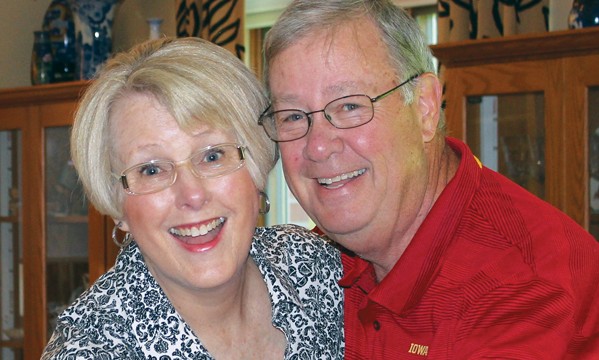
Cutting A Rug In Retirement
Eric Hoiberg can dance. And, thanks to the efforts of his son, Fred, he’s been doing a lot of that lately.
Former associate dean Eric Hoiberg, also known as the father of Iowa State University men’s head basketball coach Fred Hoiberg, is equally proud of being Andrew’s dad and Steven’s dad as he is Fred’s. Fred’s dance moves caught on video after a big win this season got national media attention, and as the team moved on to “the big dance” Fred’s efforts on the court brought Eric and his wife Karen to their feet.
Besides cheering on the Cyclones in the Sweet Sixteen and spending time with family, Eric Hoiberg also emcees the college’s annual Alumni Days open house for graduates of 50 years ago or earlier.
“I love hearing the stories of these extraordinary individuals,” says Hoiberg. “It’s good to reflect on how the college and agriculture have changed over the last 50 years.”
He’s got quite a story to tell himself. As associate dean for academic and state programs and a professor of sociology, he played a vital role in the life of the college and its students for more than 30 years.
Hoiberg’s father was a rural sociologist. It’s Karen’s father (a professional basketball player) he credits for his children’s athleticism. When Hoiberg came to Iowa State in 1974 from the University of Nebraska, his research focused on the changing structure of farming and its impacts on rural communities.
He reached all-star status with students serving as academic adviser for the public service and administration in agriculture program and teaching the introductory rural sociology class for more than 20 years.
“Eric Hoiberg was an outstanding teacher, adviser and counselor to hundreds of students,” says Paul Lasley, chair of sociology and anthropology. “He was instrumental in creating and maintaining the public service and administration in agriculture major—now known as agriculture in society.”
Serving as associate dean for academic and state programs from 1995 until his retirement in 2005 allowed Hoiberg to devote himself entirely to undergraduate education. Hoiberg witnessed a number of changes in agriculture throughout his tenure—farm size, increased opportunities for women, advanced technology—and most recently a larger emphasis on life sciences. He was part of the team that steered the college through reorganizing and modernizing the biological sciences to reflect the revolution in science.
“We have awakened to the tremendous diversity that exists in the term agriculture. We adapted to best serve and communicate with potential students and the public about this new definition without forsaking traditional production agriculture,” Hoiberg says.
Hoiberg advanced distance education programs and worked to further partnerships with community colleges.
“I looked for ways to embed critical thinking, communication and ethical content throughout the college,” Hoiberg says.
Hoiberg received numerous awards for his contributions including a USDA award for superior service and just about every teaching and advising award bestowed by the college or university.
“Dr. Hoiberg’s commitment, insights and true passion to help students succeed helped launch the professional lives of many of us PSAers in industry, academia, government and broader public service. His passion and investment in us has multiplied many times over,” says Dawn Thilmany McFadden (’90 public service and administration in agriculture and international agriculture), a professor and agribusiness extension economist at Colorado State University.
Hoiberg’s support of students continues. The Department of Sociology created an undergraduate scholarship program in honor of Hoiberg to support students majoring in agriculture and society.



